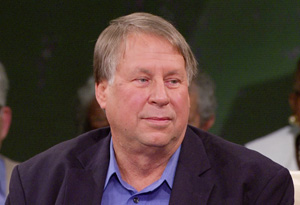Q&A with Southern Historian Raymond Arsenault

Photo: George Burns/Harpo Studios
Raymond Arsenault was just 19 years old when he started researching the 1961 Freedom Rides. He became so interested in the topic, he dedicated 10 years of his life to telling the stories of the Riders—brave men and women who fought for equality.
Now, this professor of southern history shares his expertise of the Freedom Rides, a pivotal event of America's civil rights movement. Find out what sparked his interest in this topic, what the Freedom Riders have in common and how he defines courage.
Stephanie Mitchell: You're a professor of southern history. What sparked your in-depth study of the Freedom Rides?Now, this professor of southern history shares his expertise of the Freedom Rides, a pivotal event of America's civil rights movement. Find out what sparked his interest in this topic, what the Freedom Riders have in common and how he defines courage.
Raymond Arsenault: It was largely a personal reason. I had been intrigued with the story since I was a teenager. I was a transplanted New Englander growing up in the Deep South, and so I had to confront the racial issues and questions about civil rights and regional identity from a pretty early age. When I was 19, I was an undergraduate at Princeton [University], and I became a research assistant for a young historian named Sheldon Hackney who was from Birmingham, and his wife was from Montgomery, Alabama. They both were close to Rosa Parks and had been involved in the civil rights movement. In fact, his wife's father had been Rosa Parks' attorney during the Montgomery bus boycott. So this sort of put me into a world of black and white activists that I scarcely knew existed.
I started doing work for Sheldon and immediately sort of confronted the Freedom Rides story. [I] went on and did other things, but I always had in the back of my mind that I wanted to write something on it at some point. Then in the late '90s, two of my former professors approached me. ... They said, "Well, have you got a pivotal moment for us?" I said, "Well, yes, yes I do."
I always thought it was sort of amazing that no one had ever written a book on the Freedom Riders...in fact, not even a scholarly article. There were sections of books that dealt with it—a paragraph here, a few pages there—but no one had ever done the archival research or actually talked to the Freedom Riders at any length.
I tracked them down, went to their reunions, got to know them and became a sort of honorary Freedom Rider, I suppose. The deeper I got into it, the more I realized that it was definitely a pivotal moment, not only in the civil rights struggle, but in the history of American democracy. It was one of the main reasons why the spirit of the 1960s was so different than the 1950s, and the emergence of grassroots politics and ordinary people taking it upon themselves to push the edge of the envelope when it came to social change and fighting for social justice and racial equality.
It was much larger, a much more complex story than I ever could have imagined; I never expected it to take me nearly 10 years, and it was a monster of a task, but it was a labor of love because I knew I was on to something of major importance that could potentially be an extraordinarily empowering story if it could ever get out to the mass of Americans, or to at least the lay-educated public.
What surprised Raymond while researching the Rides



